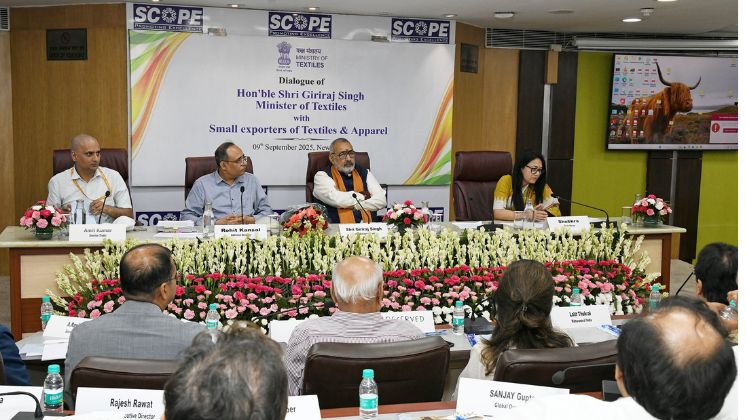- Home
- msme
- Textiles Minister Meets MSME Exporters To Strengthen Global Competitiveness & Market Growth
Textiles Minister Meets MSME Exporters To Strengthen Global Competitiveness & Market Growth

KNN
msme
9/20/2025Shathamanyu
The Ministry of Textiles convened a consultative meeting on Monday with micro, small, and medium (MSME) textile exporters across
the apparel and textile value chain, chaired by Minister of Textiles Giriraj Singh.
This marked the second such engagement, following a national-level consultation with leading exporters on 13th August 2025.
The Minister underlined the importance of strategic market diversification into 40 identified global markets and simultaneous
domestic demand expansion.
He also highlighted the impact of the 56th GST Council meeting, which rationalised the textile value chain under second-generation
GST reforms. These changes are expected to reduce cost distortions, stimulate demand, and enhance export competitiveness.
MSME exporters emphasised the need for continued fiscal support, simplified compliance, and stronger branding of handlooms,
handicrafts, and GI-tagged products.
Valued at USD 179 billion, with exports totaling USD 37.75 billion, the sector contributes nearly 2 percent to India’s GDP and
ranks as the sixth-largest global exporter, holding a 4.1 percent share in world trade. Its exports reach over 220 countries, with
participation from more than 520 districts.
Despite global volatility and steep tariffs from certain partners, the sector has shown resilience. July 2025 exports rose 5.37
percent to USD 3.10 billion, while April–July 2025 exports reached USD 12.18 billion, a 3.87 percent year-on-year increase.
Segment-wise growth was notable in readymade garments (+7.87 percent), carpets (+3.57 percent), and jute products (+15.78
percent), with handicrafts and man-made fibre textiles maintaining steady performance.
Exports to key partner countries, including Japan (+17.9 percent), the UK (+7.39 percent), UAE (+9.62 percent), and Australia
(+1.74 percent), reinforced India’s capacity to capture a larger share of the USD 590 billion global textile market.
The Minister encouraged establishing warehouses in key international markets to improve delivery timelines and promote
direct-to-consumer sales through e-commerce channels.
The government has also implemented targeted measures, including import duty exemptions on cotton until 31st December 2025,
extension of export obligations under Advance Authorisation from six to 18 months, and expansion of the PLI scheme application
window.
Four industry-led committees have been set up to advise on diversification, fiscal support, structural reforms, and innovation.
The Minister emphasised that market diversification, structural reforms, innovation, and a strengthened Swadeshi movement would
empower artisans, weavers, MSMEs, and women entrepreneurs, positioning India as a global leader across the textile value
chain—from farm to fibre, factory to fashion, and fashion to foreign markets.
Recent news
Related News


IBA Convenes Dialogue With DFS, SIDBI, Banks & Industry Associations On Supporting MSMEs
9/20/2025 Shathamanyu

MSMEs, startups urged to meet ₹50K cr defence exports target: MoS Defence
9/20/2025 Shathamanyu

MSME Ministry To Hold PM Vishwakarma & NSSH Mega Conclave In Bodh Gaya, Bihar 2025
9/20/2025 Shathamanyu